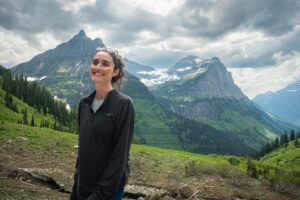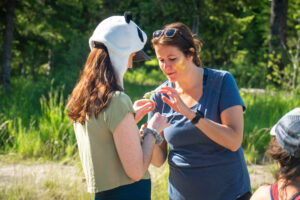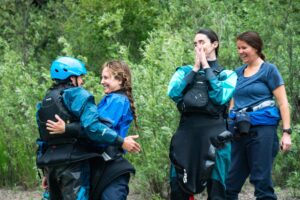Phone: 303.945.2490 Fax: 866.592.6911 Email: [email protected]
621 Kalamath St. Ste 175, Denver, CO 80204
Save the date and help us celebrate Out Living It Day on Saturday, July 27! Join a community adventure in your hometown and consider making a small donation to help us raise $25k to fuel adventure for others.
JOIN US FOR A 2024 HEALING ADVENTURE!
“My normal self-care routines weren’t working anymore, and I knew that I needed a break.”
As a healthcare worker at The Children’s Hospital at Montefiore in the Bronx, MaryKate “Glue Stick” Kelly was familiar with First Descents and had already been sharing information about the benefits of outdoor adventures with her young adult patients. It wasn’t until June of 2023, though, that she finally was able to go on a program herself: a weeklong kayaking experience on the Flathead River near Glacier National Park in Montana.

“It was on my radar for a while, but there was always too much going on, and I just kept putting it off to apply,” she says. “But then I kind of hit a wall, and I knew I was ready. I also wanted to be able to tell my patients firsthand what it was like. But really, it was like an overwhelming feeling of, ‘I need to do something fun that is purely just for me.’”
When it comes to protecting their mental health, healthcare workers have struggled for decades with long work hours, too many patients and too little support — but studies over the past year show that they have been in crisis mode since the pandemic. Because healthcare workers are so focused on helping others, they can be notoriously bad at asking for help themselves, but it also can be tough to get time off or feel comfortable enlisting a family member or friend to help out with things like childcare or pet sitting.
“I was so lucky that I had the PTO, and the support of my team for coverage while I was gone,” Glue Stick says. “But I know that’s not always the case, and that can put huge obstacles in front of self-care. It can be hard to advocate for yourself, but it’s so important. I think the first step is letting those around you know that you need that break, and start talking with them about how good this can be for you. We need this to be part of the larger conversation, too.”
For seven years, Glue Stick has been working as a child life specialist, a pediatrics-based position that provides support for children and teens from newborn to age 21 who have received a diagnosis. The native New Yorker says that the work comprises emotional, recreational and therapeutic support, with an emphasis on engaging the five senses to make complicated concepts easier to grasp.

“So I do things like meet with children who have received a diagnosis and explain their diagnosis to them in a language that’s developmentally appropriate,” she explains. “And then I help with everything that comes after that. I’m there to offer support for procedures, listen during the hard moments, talk through what’s scaring them. Whatever they need.”
Working with kids who are facing surgeries or infusions for things like cancer or a neuromuscular disorder can take a toll, she admits. “What’s great is that my day-to-day job is to provide fun, and I try to focus more on that than the harder stuff,” she says. “People who do what I do are in charge of helping kids maintain that sense of childhood while they are in the hospital or trying to understand what it means to have an illness.”
Because she is often in a playroom or other less stressful setting in an attempt to keep things light, Glue Stick — who has a bachelor’s degree in child developmental psychology and a master’s in child life — gets to explore creative ways to engage young minds, including laughter as medicine. “Hope has to be woven in somehow,” she says. “A treatment plan has to include positivity. So I get to experience more joys than sadness, and that’s what I choose to focus on. Obviously some days are easier than others, and I think that’s just the reality of the healthcare field.”
She adds that seeing how beneficial play is for a child dealing with stress aligned perfectly with her desire to join a First Descents program. “The area we were in was just so beautiful. I’ve never experienced nature like that. We had snow in June! And each day was just so amazing,” she says. “I had been kayaking on calm lakes before, but never whitewater, and sometimes it was challenging but still just so fun, it took my breath away.”
Glue Sticks says that while she loved the physical aspects of kayaking, what really struck her was how mentally healthy she started to feel as the week went on, and also how much it was impacting her fellow participants. “What was amazing for me was seeing a challenge, like a big rapid, and overcoming it. That was huge,” she says. “Like, just overcoming things you did not ever know how to do but then by the end of the week, you were doing it like it was no big deal. But even better was seeing other people do it, and cheering them on. We were all so genuinely excited for each other, and we were strangers who became friends after sharing this joyous time together.”

In fact, her favorite part about the program wound up being the ability to truly connect with other healthcare workers from different backgrounds from all over the country. “That was a huge, meaningful part of the trip, and one that I wasn’t expecting,” she says, adding that she also wasn’t expecting to spend time talking about her pandemic experiences.
“One of the things that surprised me was that I thought I’d be in this situation with all of these fellow healthcare workers who wanted to talk about their everyday frustrations, but really, everyone needed to talk about the pandemic,” she shares. “Everyone’s perspective was so different — I’d been in a big city, and there were people from rural areas whose experience getting through that was just completely different. We all needed to sort of unload it with people who understood.”
Those conversations led to an indelible bond that she and her fellow alum share to this day. “Okay, so it’s not like we group chat every day, but we definitely check in,” she says. “We get updates, things like babies being born, the loss of pets, milestones good and bad that we want to tell everyone about.”
Glue Stick also still feels close to Sara “Postal” Connell, one of the First Descents’ Lead Staff members who was on her Montana program — and the person who bestowed the nickname Glue Stick upon her. “I’ve never been so immediately seen by a stranger,” she says. “It was the first morning, and everybody had figured out their nicknames at the bonfire the night before except me. I was definitely feeling the pressure of, what happens if I don’t get one?”
The next morning at breakfast, Postal walked up to her and said, “I have a nickname for you.” First, though, Postal shared that she’d survived childhood leukemia, and that a member of her healthcare team had been a child life specialist who not only did fun things with her and the other kids, like arts and crafts, but also “made sure everyone dealing with my illness got out of there in one piece.”
“And then Postal said, ‘Child life specialists are the glue sticks of the medical team, the ones who hold everything together,” Glue Stick says. “It was seven in the morning, and I was just in tears. That was huge, and it still makes me emotional to talk about.”
Now that she’s an official FD alum, Glue Stick says she has been sharing her experiences in a new way with her patients. “My hospital in the Bronx is located in a densely populated urban community where outdoor adventures aren’t easily available or accessible for everyone,” she explains. “There are so many barriers to getting out in nature, and so I’m so thankful for the opportunities First Descents gives people to have these experiences, and that I got to experience it, too.”
“I just really wanted to be able to come back and talk to my patients and tell them, ‘This is how it works, this is what you can expect. And let me tell you, this is exactly what you need right now.”